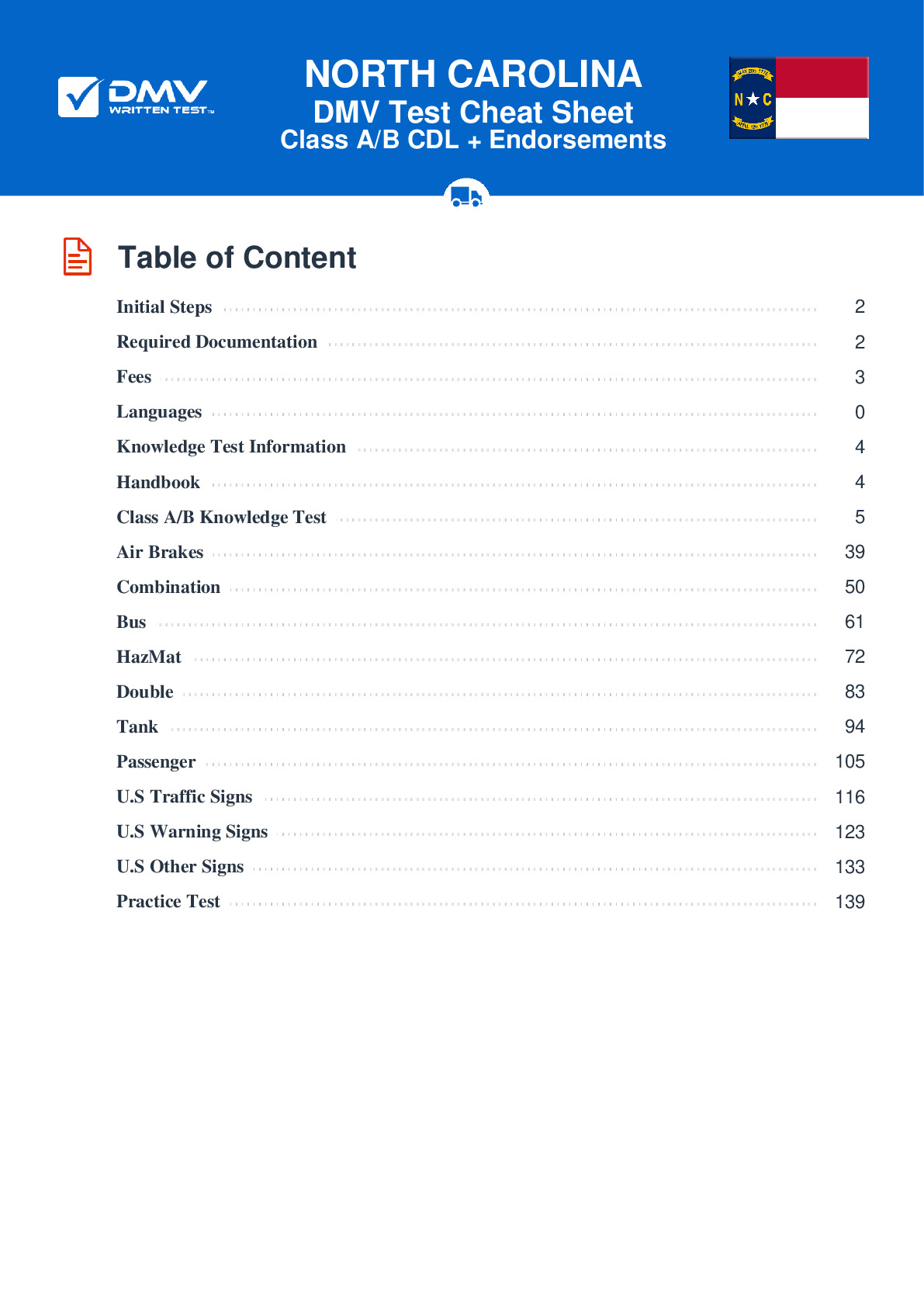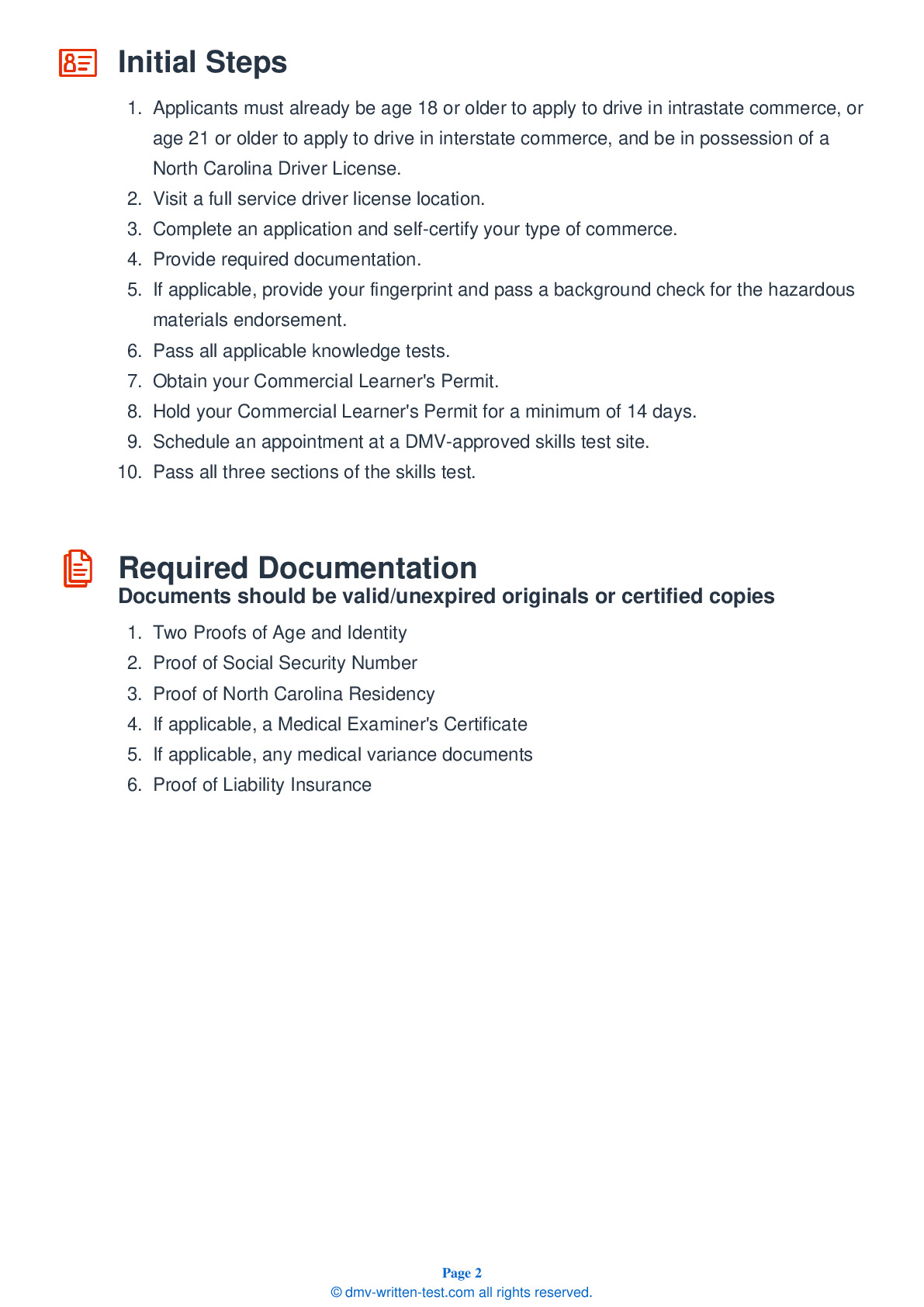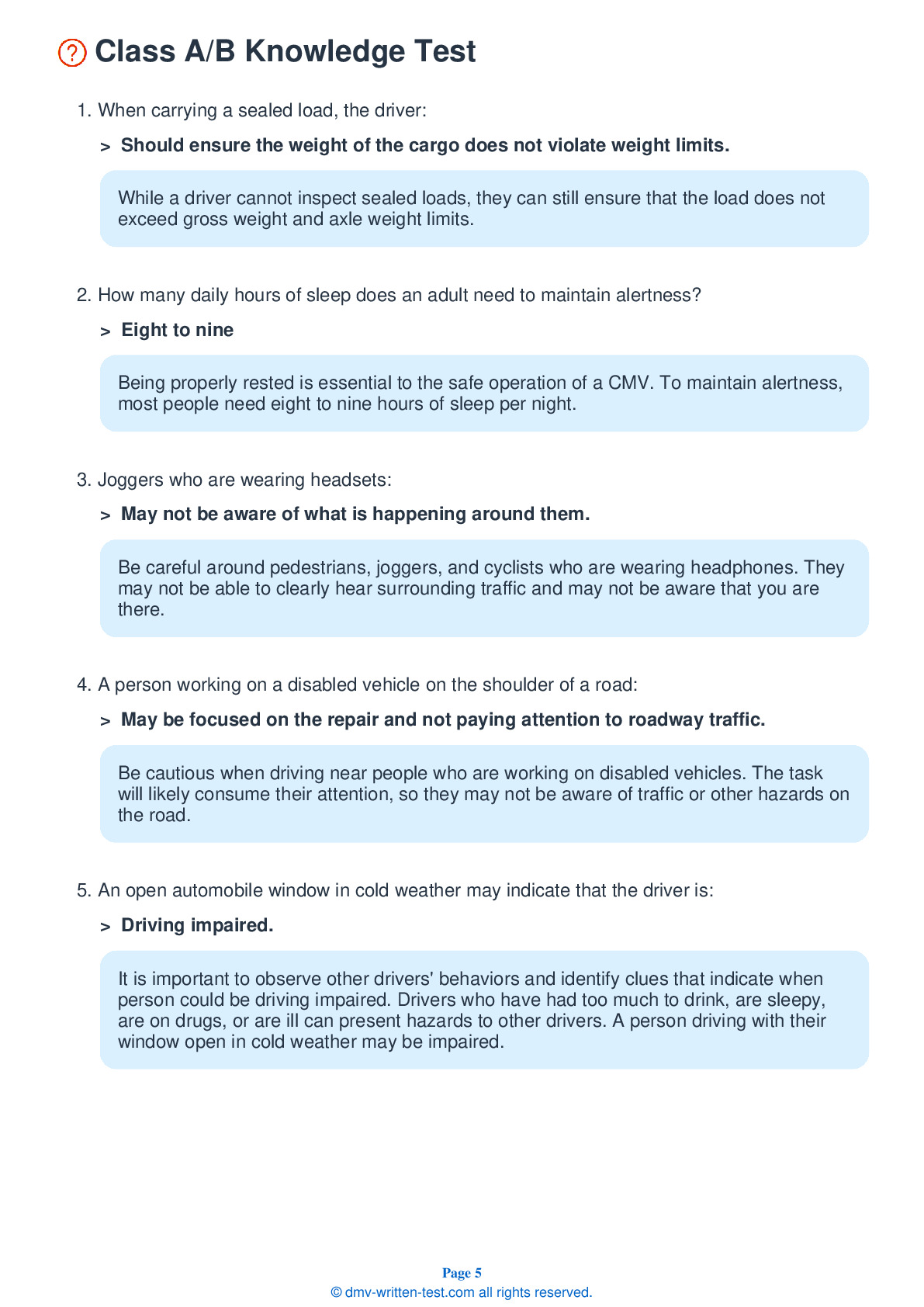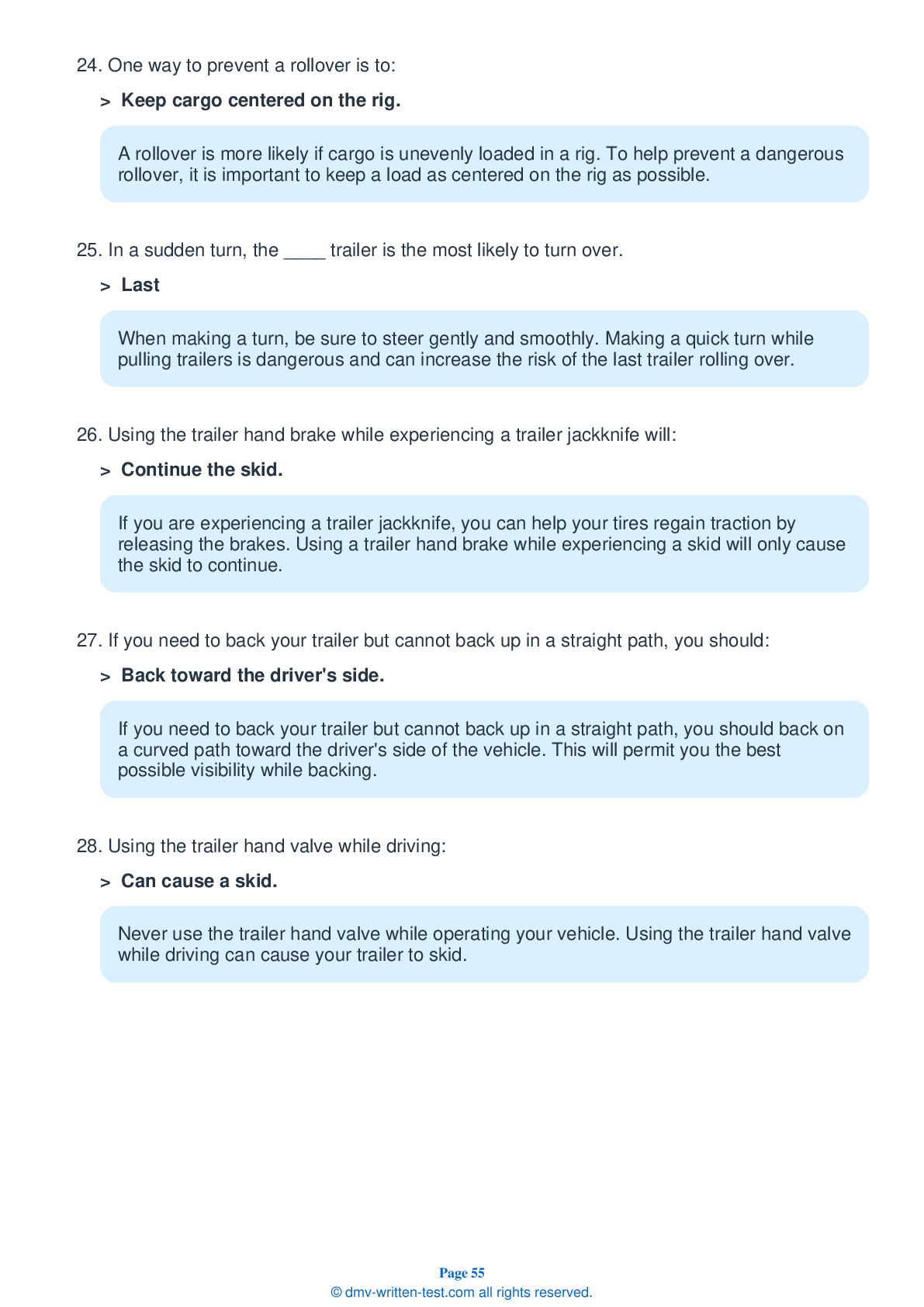Knowledge Test Class B
This license is required for driving a single vehicle with a GVWR of more than 26,001 pounds, and a trailer not to exceed 10,000 pounds gross vehicle weight rating, or a vehicle designed to transport 24 or more people (including the driver). To receive this license, applicants must pass a 50-question test. To pass, applicants must answer 40 questions correctly. Each question has three or four possible answer choices. Test questions come from the North Carolina Commercial Driver License Manual. Questions come from chapters covering: Introduction, Driving Safely, Transporting Cargo Safely, Air Brakes (if applicable), Pre-Trip Vehicle Inspection Test, Basic Vehicle Control Skills Test and On-Road Driving.. Endorsements that may be used with a Class B CDL are: Hazardous materials, Tank, Passenger, HazMat and Tank, Air Brakes and School bus.
43. If stopped on the road or shoulder, within 10 minutes, you must:
If stopped on the side of the road, you must place emergency warning devices, such as reflective warning triangles, within 10 minutes of stopping.
44. While driving, a driver should:
It is essential that you are aware of what is happening on all sides of your vehicle at all times. Scan the road ahead and make regular checks of the mirrors on both sides of your vehicle while you are driving.
45. When taking the basic control skills test, drivers are:
During the basic vehicle control skills test, you must place the vehicle in neutral and set the parking brake before exiting the vehicle to check its position. You may check the position of the vehicle no more than twice, except during the straight line backing exercise, where you may look no more than once.
46. Before attempting to put out an engine fire:
If you experience an engine fire, you should turn off the engine as soon as safely possible. Avoid opening the vehicle's hood when extinguishing the fire.
47. If you are confronted by an aggressive driver, you should:
If confronted by an aggressive driver, the most important thing for you to do is get out of their way. Avoid making eye contact, do not challenge them by increasing your speed, and do not let yourself be provoked by any angry gestures they direct toward you.
48. Sometimes, when checking the automatic transmission fluid level:
In some vehicles, you may have to leave the engine running to check the automatic transmission fluid level.
49. In a newer vehicle, you apply the parking brake:
In a newer vehicle with air brakes, the parking brake is controlled by a diamond-shaped yellow knob. The knob is pulled out to apply the parking brakes and pushed in to release them.
50. During an applied leakage test, the maximum leakage rate for a triple combination vehicle is:
It is important to know the maximum air loss rate that is safe for your specific vehicle. A triple combination should have a leakage rate no higher than 6 psi in a minute during an applied leakage test.
Frequently Asked Questions
Here are the steps to obtain a Class B CDL license in North Carolina:
1. Obtain a North Carolina Commercial Driver's Manual from a DMV office or online.
2. Pass a DOT physical examination and obtain a Medical Examiner's Certificate.
3. Obtain a Commercial Learner's Permit (CLP) by passing the knowledge tests specific to the type of vehicle you intend to drive. You must hold the CLP for at least 14 days before taking the skills test.
4. Schedule and pass the skills test, which includes a pre-trip inspection, basic vehicle controls test, and road test. You will need to provide your own vehicle for the test.
5. If you pass the skills test, return to the DMV with your passing score sheet and pay the required fees to obtain your Class B CDL.
It is important to note that additional endorsements may be required for certain types of vehicles or cargo, such as hazardous materials or passenger transport.
- Straight trucks (e.g. dump trucks, tow trucks, delivery trucks)
- Large buses (e.g. school buses, city buses)
- Box trucks
- Flatbeds
- Dump trucks with small trailers
- Cement mixers
- Refrigerated trucks
It is important to note that certain types of vehicles or cargo may require additional endorsements on your CDL, such as hazardous materials or passenger transport. It is also important to follow all state and federal regulations regarding the operation of commercial vehicles.
1. Be at least 18 years of age.
2. Hold a valid non-commercial North Carolina driver's license.
3. Obtain a North Carolina Commercial Driver's Manual from a DMV office or online.
4. Pass a DOT physical examination and obtain a Medical Examiner's Certificate.
5. Obtain a Commercial Learner's Permit (CLP) by passing the knowledge tests specific to the type of vehicle you intend to drive. You must hold the CLP for at least 14 days before taking the skills test.
6. Provide proof of identity and residency in North Carolina.
7. Pass the skills test, which includes a pre-trip inspection, basic vehicle controls test, and road test. You will need to provide your own vehicle for the test.
8. If you pass the skills test, return to the DMV with your passing score sheet and pay the required fees to obtain your Class B CDL.
It is important to note that additional endorsements may be required for certain types of vehicles or cargo, such as hazardous materials or passenger transport. You will also need to maintain your CDL with regular medical exams and renewals as required by state and federal regulations.
1. Passenger Endorsement (P): Required for drivers who will be transporting 16 or more passengers, including the driver.
2. School Bus Endorsement (S): Required for drivers who will be operating a school bus.
3. Tank Vehicle Endorsement (N): Required if you plan to transport liquids or gases in bulk containers with a capacity of 119 gallons or more.
4. Hazardous Materials Endorsement (H): Required if you plan to transport hazardous materials as defined by federal regulations.
5. Combination Tank and Hazardous Materials Endorsement (X): Required if you plan to transport both hazardous materials and liquids or gases in bulk containers with a capacity of 119 gallons or more.
To obtain any of these endorsements, you must pass additional knowledge and skills tests specific to the endorsement. You must also meet any additional requirements, such as a background check and fingerprinting, for certain endorsements like Hazardous Materials Endorsement (H).
1. Pre-Trip Inspection: You will be asked to perform a thorough inspection of your vehicle, identifying any potential safety hazards or maintenance issues.
2. Basic Vehicle Control: You will be asked to demonstrate your ability to control the vehicle in various situations, including straight line backing, offset backing, and parallel parking.
3. On-Road Driving: You will be asked to drive on public roads, demonstrating your ability to safely operate the commercial vehicle in real-world conditions while following traffic laws and regulations.
The test may take several hours to complete and will be administered by a certified examiner. You must provide a vehicle that meets the requirements for the Class B CDL and bring all required documents, including your learner's permit, medical certificate, and proof of insurance. Be sure to practice and prepare for the test by reviewing the North Carolina Commercial Driver License Manual and taking any necessary training courses.
1. Vehicle Weight: You are only allowed to operate a single vehicle with a gross vehicle weight rating (GVWR) of 26,001 pounds or more.
2. Towing: You are not allowed to tow a trailer with a GVWR of 10,000 pounds or more, except for a trailer with a GVWR of less than 10,000 pounds that is used for agricultural purposes.
3. Passenger Transport: You are only allowed to transport up to 15 passengers, including the driver.
4. Hazardous Materials: You may be required to obtain a Hazardous Materials Endorsement (H) to transport certain types of hazardous materials.
5. Time Restrictions: You may be subject to federal and state regulations regarding driving hours and rest breaks.
It is important to understand and follow these restrictions and limitations as violating them can result in fines, license suspension, or even disqualification from driving commercially. Additionally, some employers may have additional requirements or restrictions for their drivers beyond what is mandated by law.
However, it's important to note that the skills test (pre-trip inspection, basic vehicle control, and on-road driving) will be conducted in English. Additionally, you will need to demonstrate that you can read and understand English by passing a written or oral English proficiency test.
If you need a language interpreter or translator for the skills test or for other DMV services, you may bring your own interpreter or use one of the DMV's approved language services providers. However, you will need to make arrangements for an interpreter or translator in advance and pay any associated fees.
It's important to check with your local DMV office for specific information on language options and requirements for obtaining a Class B CDL.
To request accommodations for the written test, you will need to complete and submit a Request for Accommodation form and provide documentation of your disability from a qualified healthcare professional. The form and documentation should be submitted to the DMV's Driver License Section at least 30 days before your scheduled appointment.
Examples of accommodations that may be provided include extended testing time, a separate testing area, a reader or scribe, or use of assistive technology. The DMV will work with you and your healthcare professional to determine appropriate accommodations based on your disability and individual needs.
It's important to note that the skills test (pre-trip inspection, basic vehicle control, and on-road driving) cannot be modified or waived due to a disability. However, you may still be able to obtain a Class B CDL with reasonable accommodations for the written test.
If you have any questions about requesting accommodations for the Class B CDL written test, you should contact your local DMV office for assistance.
In North Carolina, you must wait at least one business day before you can retake the written test. You may take the test up to three times in a row during a single office visit. If you fail the test three times, you will need to wait at least 30 days before you can take it again.
It's important to note that there is a fee for each attempt at the written test, so failing multiple times can be costly. Therefore, it's important to prepare adequately for the test by studying the North Carolina Commercial Driver's License Manual and taking practice tests.
If you have any questions about retaking the Class B CDL written test or need additional study resources, you should contact your local DMV office for assistance.




